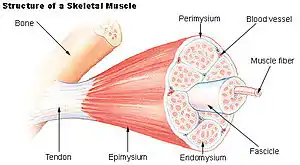| Perimysium | |
|---|---|
 Structure of a skeletal muscle. (Perimysium labeled at top center.) | |
| Details | |
| Identifiers | |
| Latin | Perimysium |
| TA98 | A04.0.00.042 |
| TA2 | 2008 |
| TH | H3.03.00.0.00005 |
| FMA | 9728 |
| Anatomical terminology | |
Perimysium is a sheath of connective tissue that groups muscle fibers into bundles (anywhere between 10 and 100 or more) or fascicles.
Studies of muscle physiology suggest that the perimysium plays a role in transmitting lateral contractile movements. This hypothesis is strongly supported in one exhibition of the existence of "perimysial junctional plates" in ungulate flexor carpi radialis muscles.[1] The overall comprehensive organization of the perimysium collagen network, as well as its continuity and disparateness, however, have still not been observed and described thoroughly everywhere within the muscle. Found to have type I, III, VI, and XII collagen.
See also
References
- ↑ E. Passerieux, R. Rossignol, A. Chopard, A. Carnino, J.F. Marini, T. Letellier, J.P. Delage (2006). "Structural organization of the perimysium in bovine skeletal muscle: Junctional plates and associated intracellular subdomains" (PDF). Journal of Structural Biology. 154 (2): 206–216. doi:10.1016/j.jsb.2006.01.002. ISSN 1047-8477. PMID 16503167.
{{cite journal}}: CS1 maint: multiple names: authors list (link)
External links
This article is issued from Wikipedia. The text is licensed under Creative Commons - Attribution - Sharealike. Additional terms may apply for the media files.